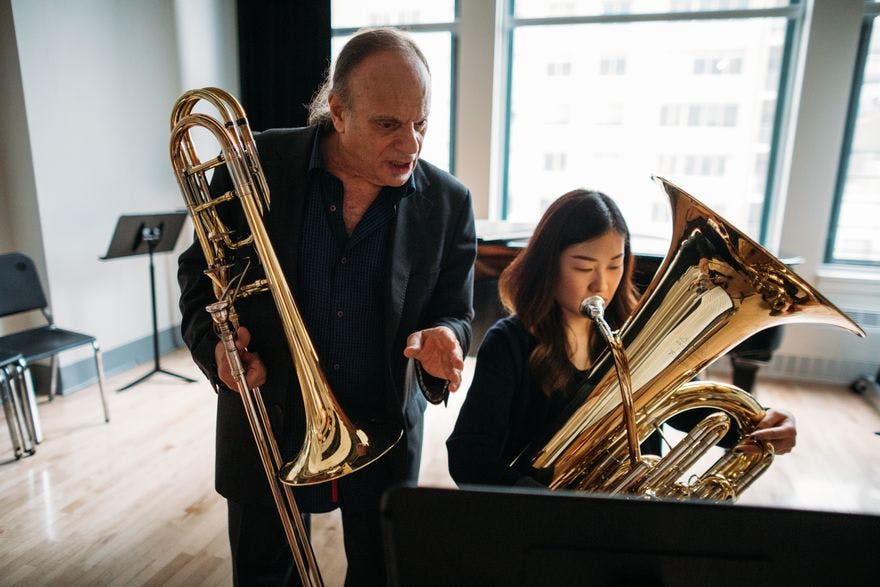
David Taylor, a trombone faculty member at Mannes School of Music, embraces a fluid approach to sound. In his nearly 30 years at Mannes, part of The New School's College of Performing Arts, he has urged his students to step outside of their comfort zone and discover their artistry.
For Taylor, musical genres are not distinct but bleed into and shape one another. “In the most abstract sense, I don't think there's a difference between classical and jazz,” he explains. Taylor's ability to glide easily between traditional and improvisational forms has yielded a versatile and prolific career.
Even a cursory glance at Taylor's repertoire reveals his skills as a musical polymath. Entering the performance world in the late 1960s, he was simultaneously a member of Leopold Stokowski's American Symphony Orchestra and a performer with the Thad Jones/Mel Lewis Jazz Orchestra. Later he would play with the New York Philharmonic and record with an array of artists, including Yo-Yo Ma, Duke Ellington, the Rolling Stones, Frank Sinatra, Aretha Franklin, Charles Mingus, and Barbra Streisand. Taylor has never been particular about the side of the genre divide he's performing on - as long as the spirit moves him, as long as the music is good.
Taylor attributes his adaptability to a lack of training early on. He admits that when he arrived at Juilliard as a young musician, he was a poor sight reader. To catch up with his peers in terms of technique, Taylor began gigging with underground jazz bands and playing in every community orchestra he could find a seat in, even the Doctors Orchestral Society of New York. He asserts that this early exposure to different styles helped him excel in his career. “When I played with the Lincoln Center Chamber Music Society, it was my jazz playing experience that allowed me to catch up to the violinists and the clarinets.”
Taylor does not expect all musicians to transcend their genres. He merely hopes to make the point that you never know what kinds of experiences might inspire your art. For this reason, improvisation and risk are the touchstones of Taylor's pedagogy. Sustained practice alone will not develop a sense of artistry in a student -the key to successful musicianship, he argues, is a propensity to “leave the building.” “As a young musician, I knew not to be ashamed of my weaknesses,” he says. “Style isn't based on just your strengths. It's all in the vulnerability!”
His exploratory approach to music education notwithstanding, Taylor remains a stickler for traditional technique. “I practice fundamentals to the point that when I go to play in a group, I can just climb into the sound around me,” he says. “Not being a slave to technique allows me to do that.” During his nearly 40 years as a teacher, Taylor has striven to provide his students with a solid foundation in canon knowledge and technique while pushing them out of their comfort zone and into the realm of artistry.
At the end of the day, he has one important message for aspiring brass players: “Always carry your horn with you. No matter what, be neurotically attached to your instrument, because you never know when there will be an opportunity to play. You're young enough-you can schlep it.”